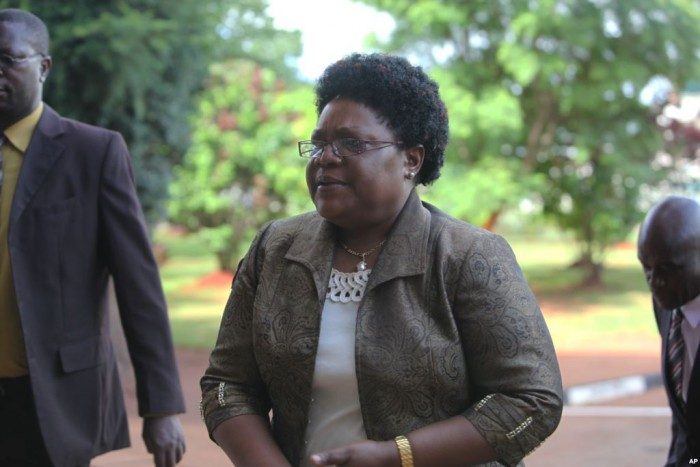


WIDESPREAD graft and mismanagement in government and State-owned institutions has resulted in the loss of millions of dollars, at a time Treasury is battling to raise funding for critical expenditure like civil servants salaries, a government report has revealed.
The report, which covers the financial period to December 31, 2013, was prepared by the Auditor-General, Mildred Chiri, and is a narrative on the appropriation accounts and miscellaneous funds. It revealed that bigwigs in strategic government positions have creamed off State resources.
The report highlighted that abuse and mismanagement of funds reached catastrophic levels between 2011 and 2013, with several ministries violating standing policies and draining the fiscus through unapproved expenditure. For example, in the Ministry of Media and Information, about 60 staff members enjoyed telephone allowances exceeding US$1 000 per month against a Treasury limit of US$200.
The ministry’s telephone expenditure climbed by 30 percent to US$546 872 in 2013, from US$132 420 in 2012, Chiri said in the report submitted to Finance Minister, Patrick Chinamasa last year but seen by the Financial Gazette. Chiri’s 322-page report unearthed shocking levels of public sector administrative deficiencies, such as failure to maintain basic books of accounts like ledgers and cashbooks.
The few cases of financial irregularities which the Financial Gazette picked from the report, indicated that at least US$800 million could have been abused across government ministries and State-owned institutions through mismanagement, fraud, needless wastage or outright extravagance during the three year period to 2013.
In one department, 18 620 litres of petrol worth US$28 616,20 and 63 540 litres of diesel worth US$106 256,40 purchased from CMED and Redan were not entered in the correct books. In the Ministry of Tourism and Hospitality Industry, directors enjoyed fuel allowances of up to 2 120 litres per month, while US$2 million worth of large screen televisions acquired for the 2010 World Cup fun parks did not benefit the State after the games as they were reportedly donated to churches.
The report raised concern over the National Oil Company of Zimbabwe (Noczim) debt redemption fund, where US$14,7 million that reflected on its accounts was not supported by documentation, such as payment vouchers and receipts. Noczim was disbanded during the inclusive government, resulting in the creation of Petrotrade and Noic, one responsible for the distribution of fuel and the other for infrastructure previously held by Noczim.
Out of US$4,2 million extended to the Small Enterprise Development Corporation by government between 2009 and 2013, only US$1,5 million was recovered, the report revealed. Millions of dollars were diverted from State departments to parent ministries, triggering unauthorised excess expenditure without Parliamentary approval. The diverted funds increased the Ministries’ votes. Parent ministries failed to reimburse the diverted funds.
At the Ministry of Transport and Infrastructure Development, directors who had resigned continued to receive cell phone allowances over a year after they had left. A large chunk of US$24 300 expended on cell phone allowances went to ghost directors. In 2011, the Zimbabwe National Roads Administration (ZINARA) disbursed US$16, 2 million to the Department of Roads.
Only US$10,6 million reflected as the amount received in the books of the recipient, creating a US$6 million black hole. “I could not validate whether all fuel coupons bought were received and duly expended for intended purposes,” Chiri commented on the Ministry of Transport’s expenditure.
“There is a risk that fuel coupons could be misused and/or misappropriated for personal gain….” she said. Chiri raised concern over several transactions, some of them approved by Parliament, which violated the Constitution and the Public Finance Management Act. No arrests or punishments related to the transactions were revealed in the report.
Quite telling were revelations that government was owed US$50 million through extravagant expenses such as travel and subsistence advances, disallowances and other unsettled revenues such as rentals and survey fees due to laxity in recovery, even where collections were possible. Chiri cast doubt on government’s capacity to recovery over US$33 million in loans extended to rundown parastatals, which were effected without the right agreements.
The country’s parastatals have a history to draining millions in dollars from Treasury every year. Most of this money has been used to sustain executives’ perks and illegitimate payments to politicians. A further US$240 million was at stake as the Ministry of Finance took long to collect various fees since 2009, while huge variations between revenues generated and actual bank balances were also reported.
“I was unable to verify the correctness of the cash in transit figure amounting to US$43 024 116 included under Note 3 of the summary of transactions of the Consolidated Revenue Fund as documents were not availed to support the figure contrary to good accounting practice. Treasury did not appear to have deposit slips and receipts to support the cash in transit figure,” said Chiri.
“The cash in transit figure could be misstated as it could not be substantiated,” she added.
“Audit revealed significant variances totalling US$409 262 306 between the Exchequer bank account and the PFMS (Public Finance Management System) records,” Chiri said.
“Due to failure by ministries to maintain proper accounting records like property registers, cash books and ledgers, the amounts disclosed under revenue and debtors were rendered unreliable. A number of Statutory Funds under some ministries were given authority by Parliament and/ or Treasury to retain revenue collected without enabling Acts as required or outlined in the Constitution of Zimbabwe. The revenue retained without an enabling Act should have been paid into and form part of the Consolidated Revenue Fund.”
The report also revealed that:
· US$17 million disbursed as schools fees for war veterans’ children under the War Veterans Fund had no names of dependents or their schools;
· The Ministry of Mines and Mining Development gobbled US$1,2 million in travel and subsistence allowances, about 37 percent of its appropriation account;
· The Mines and Mining Development Fund was defrauded of US$51 400 by former staff members in 2011. It lost US$26 876 in suspented fraudulent vehicle repairs and US$34 000 could not be validated at the Special Gold Fund after its cash register was stolen.